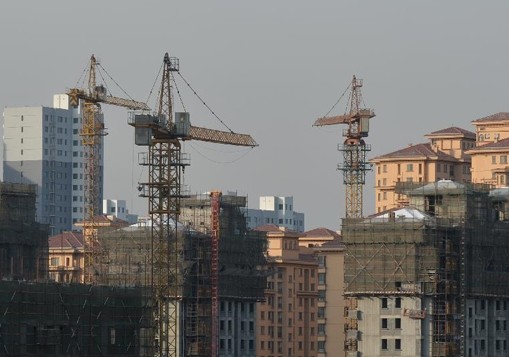

Photo taken on Feb. 22, 2014 shows residential apartment buildings under construction in Shijiazhang, capital of north China's Hebei Province. (Xinhua/Zhu Xudong)
Home prices dropped last month in more Chinese cities, more signs of a gradually cooling property sector, official data showed on Monday.
Of 70 major Chinese cities, 62 saw monthly rises in new home prices, while prices in six cities declined in January, the National Bureau of Statistics (NBS) said in a statement. New home prices fell in only two cities in December.
The average monthly increase for new homes slowed slightly to 0.49 percent last month from 0.51 percent in December, with the average in the four first-tier cities -- Beijing, Shanghai, Guangzhou and Shenzhen -- slowing 0.1 percentage point from December, the statement said.
Prices of existing homes also moderated, declining in 13 cities, as opposed to only five in December.
Senior NBS statistician Liu Jianwei partly attributed the moderation to government measures to stabilize the market, including increasing supply of affordable housing.
TIGHT CREDIT
Liu also blamed tighter credit. Since the beginning of year, commercial banks have become wary of lending to the property sector after a liquidity crunch last year.
Industrial Bank suspended loans to some property projects until the end of March, as well as steel, cement, construction and other sectors related to property. Industrial Bank's unilateral action is a reminder of risk in the property sector this year.
"Due to tight liquidity, if problems arise, they will be hard to deal with," the Shanghai Securities News cited a minute from the bank as saying Monday.
Lu Ting, chief China economist with Bank of America Merrill Lynch, said Industrial Bank had not cut off all funding to developers. The fields named account for only a small fraction of property exposure, with the majority being through normal mortgage financing.
"The Industrial Bank's decision may suggest some changes in its perception of the property sector," he said.
DIVERGENCE AHEAD
Earlier this month, in Hangzhou, capital of Zhejiang Province, a housing project announced a cut in its selling prices and set the market jittering.
The project by DoThink Group cut prices from 18,000 yuan (2,863 U.S. dollars) to 15,800 yuan per square meter last week to clear up its unsold units.
Hangzhou is one of the six cities with falling new home prices, down slightly by 0.1 percentage point, analysts claim the case as an isolated anomaly.
A slowing rise and increasing geographic diversification is exactly what analysts have predicted, Lu said.
"Diversification will increase as urbanization and migration create both winners and losers," said Lu.
Zhang Dawei, chief analyst with property agent Centaline, echoed Lu's views. Home prices drop in cities with high stockpiles and those with slower population growth, Zhang said.
First and second tier cities still have strong housing demand and prices may continue to rise, while third and fourth tier cities have excess supply and stockpiles, Zhang said.
March data will be crucial, as pent up demand from the first two months is usually released and policy will be set at the annual legislative sessions.
In 2014, Lu expects price increases to slow to low single digits year on year on tapering demands and higher supply.
Chinese property shares tumbled 3.74 percent on Monday.
China Vanke, the country's largest property developer by market value, dived 6.56 percent, while Poly Real Estate plummeted 8.51 percent.
Property developers slash home prices
2014-02-24More Chinese cities see home prices decline
2014-02-24Property bubble burst foreseen
2013-11-11Real estate bubble seen bursting in China, US: Experts
2013-11-12Copyright ©1999-2018
Chinanews.com. All rights reserved.
Reproduction in whole or in part without permission is prohibited.